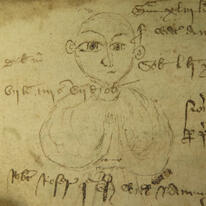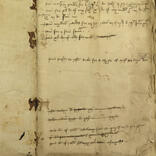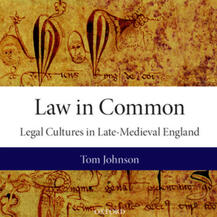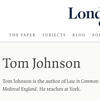bio
Tom Johnson is Associate Professor and Tutorial Fellow in Medieval History at Oriel College, Oxford.He grew up in Ipswich and studied at Cambridge and Oxford, going on to do his PhD at Birkbeck. He then worked at the University of York for eight years, taking up his post at Oxford in 2024. He is the author of Law in Common: Legal Cultures in Late-Medieval England (Oxford, 2020), as well as numerous academic articles on medieval social and legal history.His work has been recognized with research fellowships at the University of Cambridge, the Davis Center for Historical Studies at Princeton, the University of Toulouse 2 Jean-Jaures, and the National Humanities Center in North Carolina. In 2024-5 he will be a Mid-Career Fellow of the British Academy.
research
My research focuses on everyday life in fourteenth- and fifteenth-century England, with a particular interest in how ordinary people understood and interacted with legal institutions, landscapes, and archives. Among other subjects, I have written about the laws of shipwreck, what Marx can tell us about medieval ghost stories, and why people went to soothsayers in order to solve crimes.A list of my academic articles and book chapters follows below. Please get in touch if you would like a pdf.
(co-written with Claire Judde de Larivière)
‘Ordinary Politics in Late-Medieval Europe’, Past & Present (forthcoming, 2025)‘Byland Revisited, or, Spectres of Inheritance’, Journal of Medieval History, 48:4 (2022), 439-456.
Open access.‘Soothsayers, Legal Culture, and the Politics of Truth in Late-Medieval England’, Cultural and Social History, 17:4 (2020), 431-450.‘Letters of the Law: Judicial Ephemera in the Church Courts of Fifteenth-Century England’, in Open Library of the Humanities Journal, Special Issue: Medieval Court Records, ed. Jamie Page and Frans Camphuijsen (2019), 1-17. Open access.‘The Tree and the Rod: Jurisdiction in Late-Medieval England’, Past & Present, 237 (November 2017), 13-51.‘Medieval Law and Materiality: Shipwreck, Finders, and Property on the Suffolk Coast, c. 1380-1410’, American Historical Review, 120:2 (April 2015), 406-432.‘The Preconstruction of Witness Testimony: Law and Social Discourse in England before the Reformation’, Law & History Review, 32:1 (February 2014), 127-147.
‘News and Networks’, in A Cultural History of Media in the Middle Ages, ed. Carol Symes (London: Bloomsbury, forthcoming).‘Legal History and The Material Turn’, in The Oxford Handbook for Legal Historical Research, ed. Chris Tomlins and Markus Dubber (Oxford: Oxford University Press, 2018), 497-514.‘The Redistribution of Forest Law and Administration in the Later Middle Ages’, Fifteenth-Century XV, ed. Linda Clark (Woodbridge: Boydell, 2017), 93-108.‘The economics of shipwreck in late-medieval East Anglia’, in Custom and Commercialization in Rural England, c.1350-1750: Revisiting Postan and Tawney, ed. Alex Brown and James Bowen (Hertford: University of Hertfordshire Press, 2016).
books
Law in Common: Legal Cultures in Late-Medieval EnglandMy first book, published by Oxford University Press in 2020, is a social history of how ordinary people used and shaped legal institutions in the long fifteenth century (c.1380-1530). Based on a wide body of archival research, it investigates the plurality of local seigneurial, customary, and ecclesiastical courts, and shows the different legal cultures that obtained in distinct environments, such as towns, forests, and maritime communities, and how constellations of local courts structured everyday social and economic relations.The book argues that alongside this pluralism, a common set of legal practices – through the physical environment, the production of social knowledge, vernacular language, and the use of documents – generated a broader constitutional culture ‘from below’. A reviewer in The Medieval Review commented that ‘Law in Common offers an astonishingly inventive and stimulating new perspective on the social, political, and material world of fifteenth-century England. It is a major achievement.’It is available to buy here.
The Reckoners: Economic Life in a Fifteenth-Century Fishing VillageMy new book project is an economic microhistory, drawing on the rich archive of Walberswick, a North Sea fishing village. It explores how practices of ‘reckoning’ – a process that drew on accounting, credit, and debt – shaped everyday social relations. It argues that in these processes of evaluation, we can see a kind of calculative thinking that was essential to the moral economy of premodern Europe. It aims to build on recent work in this field by demonstrating the centrality of informal social practices to medieval economic culture; my hope is that it will also reach a broader audience, contributing a premodern perspective to broader debates about the history of capitalism.
essays etc.
I have written several essays for the London Review of Books. You can view them here [paywalled]I have also appeared on the LRB podcast to talk about Numeracy in Early-Modern England [free]
For the Legal History Blog, I wrote about my methodological approach to a history of law, here
For any queries about media work, I am represented by Peter Straus at RCW Associates.




